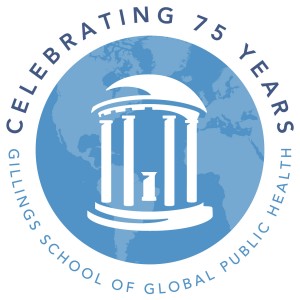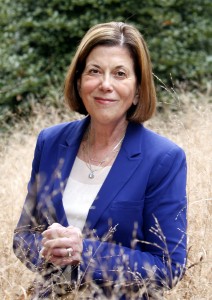A letter from Dean Barbara K. Rimer
May 5, 2014
Dear friends of the Gillings School of Global Public Health:
 On June 7, 1940, the new school of public health in North Carolina, our School, was born. Our fall issue of Carolina Public Health magazine will be a hefty one to enable us to look both backward and forward. For now, I will focus on academic year 2013–2014. Even so, much must be left out. Apologies to all the people I cannot mention by name. A list of promotions, appointments and a partial list of awards is on page 13.
On June 7, 1940, the new school of public health in North Carolina, our School, was born. Our fall issue of Carolina Public Health magazine will be a hefty one to enable us to look both backward and forward. For now, I will focus on academic year 2013–2014. Even so, much must be left out. Apologies to all the people I cannot mention by name. A list of promotions, appointments and a partial list of awards is on page 13.
In 2013, thanks to a group of dedicated alumni, led by Roy Ramthun, MSPH, we began a two-year celebration that will culminate on June 7, 2015, our 75th birthday. On Oct. 15, we kicked off the celebrations with an event at the Levine Museum of the New South, in Charlotte, N.C., thanks to alumnus Fred Brown and Michael Tarwater, chief executive officer of Carolinas Healthcare. Fred announced a generous scholarship in honor of his uncles, the Brendle brothers. See photos from several of our anniversary events on pages 16–17.
Committed to impact
We’re racing – to remain the top public school of public health; to attract the students we most want to attend the Gillings School, competing with a growing number of schools and programs, many of which have more full-ride scholarships than we do; to be awarded high-value grants and contracts in an increasingly scarce field (real NIH and other agencies’ dollars have declined); to retain outstanding faculty and staff members who are being recruited by other universities and organizations; to keep up with the pace of discovery and sheer content in the fields and topics we study and teach; and most of all, we’re in a race for impact — to make the world healthier, safer and greener.
Staying on top
While we are enormously grateful to the people of North Carolina, our legislators and University leaders for support of this School, never have government grants and contracts and private philanthropy been more important. We are blessed by the generosity of so many of you. We’re excited that in FY13, you gave the School nine new endowed scholarships. In early June, we announced the R. Gary Rozier and Chester W. Douglass Distinguished Professorship, shared between the schools of public health and dentistry through the generosity of former dentistry professor Chet Douglass and his wife Joy. A generous grant from Blue Cross and Blue Shield of N.C. adds to our opportunity to improve the dental health of North Carolinians.
Thanking our friends
We are grateful to the many alumni who give back to the School in hours of dedicated service through our departments, the Public Health Foundation Board, Alumni Association Governing Board (special thanks to two-time president and amazing woman Priscilla Guild, MSPH), and who serve so generously. Our School’s Advisory Council, chaired by Don Holzworth, Executive in Residence, has been a source of great advice and wisdom over the last few years, especially for The Water Institute and the growing group of public health entrepreneurs. We’re grateful to Ginger and John Sall for hosting our meetings at the spectacular SAS education center. (sas.com).
21st-century learning spaces
Students need comfortable, technology-equipped spaces, and we’re giving them places where they can relax, study, dream, meet and interact. Deniese Chaney, MPH, health policy and management alumna and member of our Public Health Foundation board, provided generous funding for a wonderful space in McGavran-Greenberg Hall. With plentiful electrical outlets, LCD screens and comfortable chairs, these spaces are always populated. We opened a state-of-the-art classroom in fall 2013. It’s designed for the way our faculty members teach and how students learn today — much more interactively, collaboratively and with electronics. Another model classroom will come online in fall 2014. Our facilities staff members are fabulous.
Building our own GPS
The future happens faster than ever, especially on the Internet. We’ve been improving the School’s website (sph.unc.edu) and use of social media and are supporting a new Gillings Program Search (GPS) tool to make access easier for tech-savvy students. I’m grateful to the School’s technology and communications teams, content managers, student services managers, chairs and others who contributed substantively to the GPS’s development and these advancements. Special thanks to David Pesci and his team, Kathy Anderson and her team, many content managers and student services managers across the School, Elizabeth French and former special assistant to the dean Mae Beale for her work on the GPS (sph.unc.edu/gps).
Leading groundbreaking research
In spite of even greater tightening of paylines at NIH, CDC and other funding agencies, our faculty members received about $98 million in grant funding by the end of the third quarter of FY14, close to the previous few years. Our Center for Health Promotion and Disease Prevention (hpdp.unc.edu), under the leadership of nutrition professor Dr. Alice Ammerman, was refunded, and Dr. Kurt Ribisl, professor of health behavior, was awarded one of only 14 grants in the country to examine urgent issues related to e-cigarettes. So many of our faculty competed successfully for grants; we’re proud of them.
Speeding discoveries
Like Dr. Ralph Baric, professor of epidemiology, who published a groundbreaking report about MERS just as the first U.S. case was announced (see tinyurl.com/PNAS-Baric-MERS), many faculty members are conducting cutting-edge research in fields we have only begun to understand. Dr. Michael Kosorok, W.R. Kenan Distinguished Professor and chair of biostatistics, leads a project to develop smart and smarter clinical trials methods so that effective new cancer drugs will get to patients faster. He and colleagues from UNC, Duke and N.C. State published more than 128 peer-reviewed papers in the first four years of their NCI-funded program project.
Water, water, everywhere
After a little more than three years, our Water Institute, led by Dr. Jamie Bartram, Holzworth Distinguished Professor of environmental sciences and engineering, is now recognized as the go-to place for meetings of the best and most influential on urgent issues related to water and sanitation. (See waterinstitute.unc.edu.) Bartram and colleagues are doing critical research on many issues related to water access, availability and safety.
Global healthy aging
The growth of global aging populations has created what has been referred to as a cliff, as baby boomers adapt to the challenges of aging. Our goal is to help people stay healthy as long as possible in N.C. and around the world. In February, thanks to our two-year partnership with Cambridge University, to Dr. Dennis Gillings, CBE, who has supported the partnership with Cambridge, and to Dr. Michael Kafrissen, alumnus and Advisory Council member, and affiliated with MIT’s AgeLab, we jointly sponsored a groundbreaking meeting on global aging-in-place and technology. People came from all over the world, and even more people wanted to come. (More about key players at the aging summit is at sph.unc.edu/news/aging-summit.) Dennis Gillings, by the way, recently was named World Dementia Envoy by U.K. Prime Minister David Cameron to raise awareness and funds for research and a cure for dementias. There will be a lot more to say about this topic.
Our faculty and students
Several new faculty members joined the Gillings School this academic year, and we’re so glad they came. (See Our faculty for more information.) I’m proud of recognition faculty members received from the University, including Dr. Marilie Gammon’s doctoral mentoring award from the Graduate School, Dr. Karl Umble’s undergraduate teaching award, and Bill Gentry’s Ned Brooks Award for public service. Our students won many awards; among the sweetest are the Graduate School’s Impact Awards, which recognize the positive impact of our students’ research on North Carolina and its people. Our students took home four of the 20 Impact Awards.
Leadership appointments
We appointed Dr. Beth Mayer-Davis, an outstanding diabetes researcher, as chair of nutrition. Dr. Carolyn Halpern, an MCH professor and expert on adolescent sexual behaviors, will be interim chair of maternal and child health while we seek a permanent chair. We appointed Dr. Andy Olshan the Barbara Sorenson Hulka Distinguished Professor of Cancer Epidemiology. The search is underway for a director of the Gillings Global Gateway, our new one-stop location for all things global. I’m grateful to Julie MacMillan, MPH, for taking on the additional role of interim director and also to Susanne Moulton, JD, MPH, health policy and management alumna, who is serving as interim associate dean for SPH Advancement (formerly External Affairs).
Helping our entrepreneurs
With help from Don Holzworth, Judith Cone (special assistant to UNC’s Chancellor Folt for innovation and entrepreneurship), Julie MacMillan and others, we’re helping our entrepreneurs to flourish. This past spring, we hosted representatives of the N.C. legislature, Board of Governors and Board of Visitors, and they all were impressed by the School’s focus on solutions and by the growing number of successful entrepreneurs who have taken their products and programs to new levels.
Urgency of implementation
A new course, the Gillings Implementation Lab, was led by Dr. Rohit Ramaswamy, in partnership with several other faculty members. The course introduces students to the emerging field of implementation science through didactic material presented online and problem-solving in field settings (this year, in Raleigh, N.C., and India). I was excited to hear the students’ final presentations. Half had collaborated with FHI360 in Delhi, and half intervened at Wake County (N.C.) Social Services. This is yet another example of the positive impact our students achieve, even while still in school.
This new course, and Dr. Bert Peterson’s work in implementing proven programs to reduce maternal and infant illnesses and deaths, are focused upon the urgency of implementation — applying what we know in sustainable ways — to solve some of the world’s most pressing health problems. We could save millions of lives from scores of conditions and diseases if we could master the science and practice of implementation. Last year, we launched a new Consortium on Implementation Science, in partnership with RTI International. Dr. Bryan Weiner, professor of health policy and management, leads the UNC-Chapel Hill effort — and there’s a lot of talent in implementation science across the School.
Enjoying our 2014 Commencement
See the wonderful photos on page 15 (and at tinyurl.com/flickr-gillings-2014-commence) that capture the joy of commencement. We were honored to have two-time alumna, Dr. Nicole Bates, as our speaker. She did a superb job! Dr. Atul Gawande, professor of health policy and management and surgery at Harvard, did a great job with the UNC Commencement remarks.
So much more
The story of a year at the Gillings School unfolds with new chapters every day. There are many heroes — faculty and staff members who have persevered in spite of unrelenting budget cuts and lack of raises; students who venture far from their homes and comfort zones to solve problems; our nearly 18,000 alumni, who solve public health problems in every state and 100 countries; donors who believe in us and give generously.
In the end, the biggest gift is providing resources that enable us, with you, to rewrite the sad stories of lives lost, communities without water, inequities endured and childhoods foregone — and to turn them into narratives of hope and dignity restored, resources gained, lives lengthened and independence enabled. Why? Because health is one of the most precious gifts in the world.
Warm regards,
Carolina Public Health is a publication of the University of North Carolina at Chapel Hill Gillings School of Global Public Health. To view previous issues, please visit sph.unc.edu/cph.

